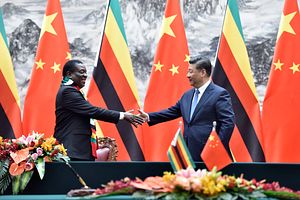Zimbabwe’s President Emmerson Mnangagwa will be in China from April 2 to 6 for a state visit, his first to the country since assuming office after a military intervention forced long-time President Robert Mugabe to step down. In a meeting with Chinese President Xi Jinping, Mnangagwa promised to keep ties close, while Xi proclaimed a “new chapter” in China-Zimbabwe relations.
China developed deep ties with Zimbabwe under Mugabe, starting from providing support to his Zimbabwe African National Union (Zanu) during the Rhodesian Bush War in the 1970s. Ties solidified with Mugabe leading the country, as his repressive practices isolated Zimbabwe from other potential backers. Today, China is Zimbabwe’s top export market and accounts for nearly three-quarters of all foreign direct investment into the country (mainly centered on energy, mining, and agriculture projects). Beijing has also promised billions of dollars in aid. The relationship was so close that Xi Jinping described the two as “all weather friends” during a visit to Zimbabwe in 2015.
However, the events of November and December 2017 made it clear that China’s support was not linked to Mugabe personally. On November 21, 2017, Mugabe was forced to resign the presidency after a military intervention designed to end his 37-year reign over Zimbabwe. In the period of time after the coup, but before Mugabe’s resignation, China emphasized its principle of noninterference, ruling out any possibility of explicit support for the embattled leader.
Just ahead of the coup, General Constantino Chiwenga, then the commander of Zimbabwe’s Defense Forces, was in China for an official visit. A month later, a Chinese delegation was in attendance when Mugabe’s former vice president, Mnangagwa, was confirmed as the new head of the ruling Zanu-PF. Beijing expressed its support for Mnangagwa immediately upon his official assumption of office.
These circumstances led to rumors that China had tacitly backed Mugabe’s ouster – despite the close relationship between China and Zimbabwe that had flourished under the longtime strongman.
As Wang Xinsong noted in an analysis for The Diplomat, rumors of Chinese intervention in the coup are “speculative at best,” but “there is no doubt that China holds a high stake in Zimbabwean politics due to their close economic and political relations.” Those risks did not disappear with Mugabe, however; now China will be watching to see if Mnangagwa can deliver economic and political stability that Mugabe could not.
With elections slated for later this year – and China’s relationship with Zimbabwe facing criticism within the African nation – Beijing will be hoping to keep Mnangagwa in power to avoid any further risks to its investments. Rolling out the red carpet for the new leader is one way of boosting his political legitimacy at home – providing new aid and investment in a bid to help Zimbabwe’s struggling economy is another.
In talks with Mnangagwa, Xi reaffirmed China and Zimbabwe’s “all weather” friendship, according to Xinhua. Going further, the two sides announced that they would elevate their relationship to a comprehensive strategic partnership. Xi also specifically said that China was “glad to see” Zimbabwe starting a “new journey in building their country” under Mnangagwa, and offered Beijing’s support for those efforts.
In response, Mnangagwa said that Zimbabwe “would never forget China’s long-term assistance,” according to a Xinhua paraphrase. He also promised to continue to back China’s core interests, from the one China policy to the Belt and Road Initiative. Mnangagwa’s visit itself is a sign of the importance he attaches to relations with China; it’s his first state visit outside the African continent since assuming the presidency.
Mnangagwa is particularly hoping to seal economic deals during his visit. In a speech in Beijing, Mnangagwa emphasized the importance of foreign investment to Zimbabwe’s economic revitalization, and provided a laundry list of areas for consideration: transportation infrastructure (including roads and railways); energy, water, and communications infrastructure; mining, agriculture, tourism, manufacturing, and financial services. In addition to Beijing, he is scheduled to travel to the provinces of Anhui and Zhejiang, according to Zimbabwe’s The Herald, where he will meet with “the business community.” Already, The Herald reports, “A Zimbabwean business conglomerate has secured $500 million worth of deals in agriculture, mining and transport sectors to aid Zimbabwe’s economic transformation.”
Chinese investments in Zimbabwe are not without their critics, but Beijing is betting that the economic benefits will outweigh the political risks, and help keep Mnangagwa and Zanu-PF in power for years to come.

































